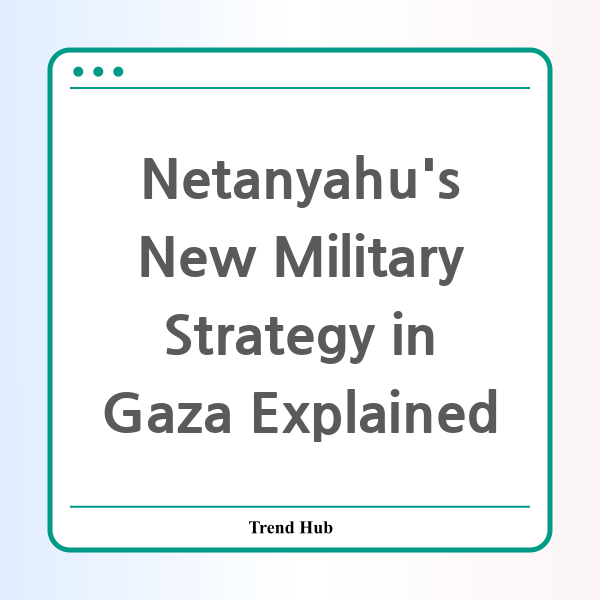* This website participates in the Amazon Affiliate Program and earns from qualifying purchases.

Is Israel's military strategy in Gaza shifting towards a permanent presence?
In a bold statement, Israeli Prime Minister Benjamin Netanyahu has announced a significant escalation in military operations in Gaza, indicating a long-term strategy that aims to "conquer" the territory. Following the approval of this expansive military plan by his security cabinet, Netanyahu declared that the operation's goal is far-reaching, with implications not just for Gaza's governance but also for its civilian population.
This new operation, dubbed "Gideon’s Chariots," is set to change the dynamics in the region. Netanyahu emphasized that the military's focus will be on holding territory rather than merely conducting raids. In his video message on X, he stated, "One thing will be clear: there will be no in-and-out." This statement highlights a strategic shift towards establishing a more permanent military foothold in Gaza.
The current situation in Gaza is complex, with significant humanitarian implications. Netanyahu's plan involves the displacement of Gaza's population to the south, purportedly as a protective measure during the intensified military operations. A senior Israeli security official conveyed that the intent is not only to subjugate Hamas but also to secure the release of hostages held by the militant group. This dual objective introduces a level of urgency to the operations, particularly with a potential diplomatic window opening following an upcoming visit from US President Donald Trump.
However, the announcement of an expanded military operation has ignited controversy. Critics, including families of hostages, fear that the Israeli government may be prioritizing military objectives over the safety of individuals captured by Hamas. The tension between military strategy and humanitarian concerns is palpable, particularly as the UN has raised alarms about likely increases in civilian casualties.
The Israeli government has also hinted at a new aid mechanism to facilitate humanitarian support in Gaza. This approach has received criticism for potentially consolidating control over aid distribution, which could exacerbate tensions between different groups operating within and outside Gaza. Notably, Hamas has dismissed this new framework, arguing that it compromises humanitarian principles, highlighting the contentious nature of the ongoing conflict.
As this situation unfolds, the world watches closely. The impending military operations not only affect the population of Gaza but also have potential repercussions for regional stability and international relations. With Netanyahu’s commitments to a sustained military presence, the path forward appears fraught with challenges and difficult choices for all stakeholders involved.
In conclusion, the escalation of Israel's military strategy under Netanyahu's leadership raises important questions about the future of Gaza, the humanitarian impact of military operations, and the broader implications for peace in the region. As the operation "Gideon’s Chariots" prepares to unfold, the international community must navigate the complexities of this ongoing conflict with care.
* This website participates in the Amazon Affiliate Program and earns from qualifying purchases.